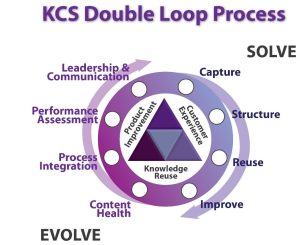What’s KCS®? Knowledge-Centered Service Explained


“In order to get dramatically different results, we have to do something dramatically different.”
While technical support used to be an internal, back-office department that customers never saw, today’s customers interact with technical support and service desk teams on a daily basis. Support teams within organizations may struggle to keep up with demand, but Knowledge-Centered Service is changing that.
Knowledge-Centered Service (KCS®) emphasizes knowledge as a critical asset for delivering service and support—across the enterprise. In this article, we are exploring the KCS principles and methodology. We’ll take a look at these topics:
Knowledge-Centered Service (KCS) is a best practice methodology that provides a detailed description of how service organizations can work more effectively with knowledge in order to:
The KCS methodology is developed and continues to be maintained by the Consortium for Service Innovation (CSI), a non-profit alliance of service organizations. Current CSI members include DELL Technologies, Hewlett-Packard Enterprise, Ericsson, Cisco, Oracle, BMC, and many more. BMC is proud to sponsor the Consortium and take part in the ongoing development of the KCS methodology.
KCS stood for “Knowledge-Centered Support” until the v6 release in April 2016 at which time the name was updated to “Knowledge-Centered Service”—because it goes beyond support.
(See how KCS can benefit your organization in this introductory webinar.)
In 1992, the Consortium for Service Innovation (CSI) formed as a non-profit alliance of support organizations. The membership-based organization focused primarily on designing tools with specific features and functionality that would assist organizations in capturing and reusing knowledge as a by-product of work performed.
Within a couple years, the members within the Consortium realized an inherent truth—no matter how good the tools, knowledge management success rests with people and their behaviors.
By the mid-1990s, the Consortium switched focus to defining enterprise best practices that focus on people instead of technology. In the 2000s, CSI started to promote and facilitate understanding and implementing the KCS approach to knowledge management.
Today, the methodology focuses on knowledge as a key asset of an organization.
KCS has been effectively and successfully implemented in organizations large and small, including some multi-national groups including Apollo Group, Autodesk, Avaya, Dell, EMC, Ericsson, HP Enterprise, Oracle, and Salesforce.
Like related frameworks such as ITIL®, which aims to improve all aspects of enterprise service delivery, KCS focuses particularly on knowledge management across the enterprise.
To understand KCS, let’s take the long view of service teams in digital workplaces.
In most organizations, regardless of size, service desks of all kinds—IT, HR, marketing, and more—are swamped with requests, ranging from small, tedious items that are easy to accomplish but take time, to larger problems that must be dealt with immediately. IT service teams are always balancing these requests, based on priority, individual knowledge of a problem, time required researching, and time reaching out to people beyond the service team.
The problems with these issues are clear:
Knowledge is a major solution to these bottlenecks. Accessing pre-existing knowledge helps drastically reduce the time spent solving problems, therein saving money and resources. This practice—knowledge management—helps mitigate the challenges of service teams that are under increasing pressure to respond to customers correctly, quickly, and flexibly.
When a service team solves an issue, often handled by only one person, it is very common for that knowledge solution to go by the wayside. With one problem solved, employees move to the next problem. In a knowledge-centered organization, that information would be captured for future use, in a knowledge base, in order to save time and resources when the same or similar issues arise again.
If no knowledge base has been built, there’s no place for that specific knowledge to become part of a collective, collaborative knowledge.
While knowledge is a clear solution to the chaotic reality for service and support teams, implementing knowledge management effectively still eludes many organizations. The challenges are two-fold: building a knowledge base, then using it successfully.
Building a knowledge base takes time, priority, and a joint approach with teams beyond the service desk. Unfortunately, knowledge management often isn’t prioritized or embraced by a large enough group of knowledge experts—it’s often seen as an extra task for an already overloaded team.
In cases where organizations have already implemented some type of knowledge center, there are still bottlenecks to successful implementation: too much bureaucracy in the way of reviews or approval cycles or a lack of priority or time in developing it. In some situations, content that has been created often isn’t relatable or contextual to the customer experience.
This is where KCS comes in. The theory maintains that speeding up service is very doable within a provided network for the service and support teams to access and maintain knowledge.
There are four principles of KCS that aim to create an environment optimized for knowledge sharing:
KCS isn’t just theoretical though: its tenets provide both a method and techniques that help organizations respond to issues quicker, including shortening the time necessary to address complex issues, and provide consistent answers for customers that enable self-service support.
The goal of KCS is to integrate the use of a knowledge base into an organizational workflow in order to:
“KCS® improves time to proficiency up to 70% and gives you 30% more satisfied employees.”
In order to get dramatically different results, we have to do something dramatically different. KCS represents a new way in thinking about work, people, process, and measures—and the benefits are profound. You can expect to see these outcomes:
KCS also brings a cultural shift that embraces the “content is king” concept: teams can now rely on collaborative knowledge instead of individual, untracked learning experiences. Collective knowledge means the service team doesn’t have to be the only team solving issues, and it helps the organization onboard new agents a lot quicker and reliably while staying flexible and relevant to the customer.
KCS provides a continuous improvement concept for managing, sharing, and improving knowledge, effectively becoming the way support and service teams provides support, both to internal and external users.
Relying on core concepts such as continual improvement, collective experience, and collective ownership, and seeking to understand before seeking to solve, KCS helps organizations create and review knowledge articles. The articles go through draft, approval, and publishing phases, which in combination with the KCS roles and licensing model, support increased confidence in both content and people.
The resulting cost-benefit savings includes fewer support calls and fewer cases logged. It helps users become more self-sufficient and more proficient If implemented properly, KCS does not add handle time to the task of resolving issues Instead, KCS becomes the way in which issues are resolved.
Knowledge-Centered Service relies on two continuous loops, the Solve Loop and the Evolve Loop, together known as the Double Loop Process.
Let’s look at each component.

The Solve Loop is the request-response workflow. Creating knowledge articles is a by-product of resolving issues. Articles can be used for many different types of content including a simple question, a complex problem, or a procedure. The knowledge articles must be:
Articles are reviewed and improved over time based on demand and usage with the concept “reuse is review”. The access to the knowledge base increases the service organization’s speed, accuracy, and consistency in solving issues that have already been solved before.
There are four practices of the Solve Loop:
The Evolve Loop reflects on and learns from a collection of Solve Loop tasks and associated knowledge articles. It identifies areas for improvement in the Solve Loop and to the business, such as improvements to products, services, processes, and policies.
The Evolve Loop has four practices, focused on knowledge base health, workflow, value assessment and leadership’s role throughout the KCS journey.
With KCS training, you will learn the KCS Principles and Core Concepts, as well as the techniques and organizational requirements for successful KCS implementation and adoption.
 The KCS Academy, a wholly owned subsidiary of the Consortium for Service Innovation, offers KCS training and certification for people and KCS Verified and Aligned designations for tools and services. The KCS Academy is the only authorized certifying body for KCS, through KCS certified trainers.
The KCS Academy, a wholly owned subsidiary of the Consortium for Service Innovation, offers KCS training and certification for people and KCS Verified and Aligned designations for tools and services. The KCS Academy is the only authorized certifying body for KCS, through KCS certified trainers.
On top of training, the Consortium and the KCS Academy offer regular workshops, meetings, web sessions and forums for practitioners and vendors to nurture and develop the methodology.
BMC provides you with the needed knowledge, skills, services, and solutions to achieve knowledge management and self-service success across the enterprise. Our experts can help you set up the processes and solutions based on your needs and our experience.
BMC is one of the members of the Consortium for Service Innovation, and provide official KCS Academy training and certification in Knowledge-Centered Service (KCS®) via our KCS Certified trainers.
You will get the skills needed to launch, improve, or refresh your knowledge management processes.
This training is intended for individuals who are, or will be using, the KCS Practices in support and service centers to resolve issues for internal or external customers. This entry-level KCS training is a great way to ensure a common understanding of the methodology, and to help individuals demonstrate a basic understanding of the KCS concepts.
(Read more & register at BMC Education.)
This training and optional certification exam is intended for individuals who require a thorough understanding of both the KCS methodology and its adoption. This includes people who manage or advise on the adoption and continuous improvement of the KCS practices. This course is also appropriate for product managers whose products align with or enable the KCS practices.
(Read more & register at BMC Training and Certification.)